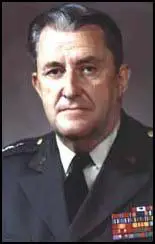Vernon Walters

Vernon Walters, the son of a British insurance salesman, was born in New York on 3rd January, 1917. In 1923 the family returned to Britain. After a spell in France they arrived back in the United States in 1933. Walters then found employment as an insurance claims adjuster and investigator.
After President Franklin D. Roosevelt declared war on Japan in December, 1941 Walters joined the U.S. Army. In 1942, as a result of being able to speak several languages, he became an intelligence agent. His first assignment was to infiltrate a group of suspected Nazi spies.
Walters became an aide to General Mark Clark and in 1944 was with him when US troops liberated Italy. After the war Walters served as an aide to W. Averell Harriman at the Marshall Plan headquarters in Paris. And in 1951, as a lieutenant colonel, he returned to Paris to help set up the Supreme Headquarters Allied Powers in Europe.
In the 1950s Walters worked as an aide and interpreter to Harry Truman, Dwight Eisenhower and Richard Nixon. Walters was fluent in French, Spanish, Italian, German, Portuguese, Chinese and Russian. He also represented Truman when he was was in conflict with General Douglas MacArthur, commander of United Nations forces in Korea.
In 1972 President Richard Nixon appointed Walters as deputy director of the Central Intelligence Agency. When Richard Helms was sacked in 1973 he was acting director for two months. He was also deputy director under William Colby. He left the CIA in 1976.
From 1981 to 1985, Walters was ambassador at large in the Ronald Reagan administration, visiting more than 100 countries. He was ambassador to the United Nations from 1985 to 1988 and then ambassador to Germany until 1991.
Walters was the author of two books, his autobiography, Silent Missions (1978) and The Mighty and the Meek (2001), a book about famous people he had worked with during his life.
Vernon Walters died in West Palm Beach, Florida on 10th February, 2002.
Primary Sources
(1) Michael Ledeen, National Review (15th February, 2002)
General Vernon Walters has died, and a hell of a man he was. He never went to college, but he spoke 16 languages, many of them so perfectly that natives took him as one of their own. He enlisted in the Second World War, and worked his way up through the Army ranks to become a two-star general. He served as deputy director of Central Intelligence during Watergate, and emerged with honor. He became ambassador-at-large at the State Department, and always got the toughest missions, whether it was reading the riot act to difficult allies like, as he invariably put it, "the mad Mobuto" in Zaire or killer generals in Argentina. His last official post was ambassador to West Germany during the G. W. H. Bush years, and he was apparently the first American official to conclude that German unification was going to happen, and we'd better get on board.
Enough glory for five good men. And with Dick Walters you got a lot more. You got real comradeship, a rare quality in the best of times, and especially in recent years. You got someone who was willing to share his wisdom with younger colleagues. You got a religious man, a devout Catholic, who did not use the vulgarity typical of the military. And you got the greatest speaker I have ever seen in American public life.
A few years ago I heard him interviewed in front of a thousand businessmen and women in Melbourne, Australia, and the interviewer gave him a great question. "Tell me, General, in your diplomatic activities, did you ever use flattery? And if you did, how did it work"
Walters answered in a nanosecond: "Anyone who thinks flattery doesn't work obviously has never had any."
When Walters was ambassador-at-large, I was, so to speak, ambassador-at-small. He got the important missions, I got much less important ones. I had never been in government, and he made it as pleasant as he could. He found a proper secretary for me, one of those plain-speaking, uppity types who would tell me when my instincts were bad, and, so help me, refuse to type memos she thought would get me in trouble. And then, from time to time, he took me along with him, so that I could kibitz and learn how diplomacy could be done by one of its greatest practitioners.
(2) Senior U.S. statesman Vernon Walters dies at 85, CNN News (15th February, 2002)
Fluent in seven languages besides English, Walters was a translator for President Dwight Eisenhower in meetings with French President Charles de Gaulle. He served as ambassador at large in the Reagan administration, and later as ambassador to the United Nations and to Germany.
He spent much of his life in the world of political and strategic secrets. He was in Tehran when the CIA staged a coup supporting the shah of Iran in 1953, and in Brazil when a group of generals staged a coup in 1964.
During the Nixon administration, he helped Henry Kissinger conduct secret negotiations with the North Vietnamese before the United States withdrew from Vietnam.
Walters was deputy director of the Central Intelligence Agency from 1972 to 1976.
In a written statement, CIA Director George Tenet said of Walters: "His was an exceptionally rich life of service to country and humanity. A natural leader, he rose to excellence in every profession he entered - soldier, intelligence officer, diplomat."
